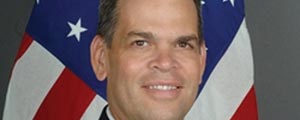
ALL relationships evolve and grow, just as all individuals do. The United States-Zimbabwe relationship is the same. For too long, our government-to-government relations have been frosty even while many of our people have enjoyed warm friendships, cultural exchanges, and mutual respect.
By Bruce Wharton
Civil rights leader Ambassador Andrew Young visited Zimbabwe recently at the request of the US Department of State to explore ways to improve our government relations. He came with a clear, sincere message: the US wants to see full normalisation of bilateral relations following credible, non-violent elections that reflect the will of the people.
We believe that dialogue and respectful engagement are the first steps to moving our bilateral relationship forward and I have been working to achieve this since my arrival last year. The visit by Ambassador Young and earlier visits this year to Zimbabwe by senior US government officials are part of this initiative.
These engagements acknowledge the progress of the constitutional reform process and referendum, and underline our belief that the upcoming campaign and national elections offer crucial opportunities for Zimbabweans to work together to strengthen the nation.
US policy toward Zimbabwe is guided by our support for the democratic institutions and processes that allow the people of Zimbabwe to choose their leaders. Rule of law, good governance, and protection of human rights are all critical to enabling the will of the people and building a strong, stable society that can create jobs and meet social needs. The US will recognise and engage the winners of a credible, non-violent election.
Just as the US took gradually more restrictive actions in response to political violence, human rights abuses and selective application of the rule of law, our response to positive trends will also be phased and will track with the speed and magnitude of improvements on the ground. Peaceful, credible elections will be real progress and will lead to action on the part of the US — to include full normalisation of relations and the end of sanctions.
Until then, we will pursue smaller scale actions to demonstrate our recognition of progress made and our commitment to the process of normalising relations. Last week, the US Treasury Department’s Office of Foreign Assets Control suspended financial restrictions on two Zimbabwean banks: the Agricultural Development Bank of Zimbabwe (Agribank) and the Infrastructure Development Bank of Zimbabwe (IDBZ). This suspension — or licences as they are technically known — allow the banks to conduct normal business with, or through, the American financial system. This decision is part of our commitment to actively respond to positive developments in Zimbabwe.
- Chamisa under fire over US$120K donation
- Mavhunga puts DeMbare into Chibuku quarterfinals
- Pension funds bet on Cabora Bassa oilfields
- Councils defy govt fire tender directive
Keep Reading
Should Zimbabwe hold peaceful, credible presidential and parliamentary elections this year that are broadly observed and reflect the will of the Zimbabwean people, the US is prepared to consider significant further actions toward ending targeted sanctions, developing trade and economic ties, and further normalising our bilateral relationship with Zimbabwe.
We are also prepared to consider rolling back our sanctions on Zimbabwe in response to positive progress on Zimbabwe’s part in meeting its own reform commitments under the Global Political Agreement and the Sadc roadmap.
However, we want to see President Mugabe’s call for peaceful, unbiased elections honoured and enforced. We believe this should include giving civil society organisations space to operate without impediment within the parameters of the law.
Key State institutions, especially those in the security sector, have a special responsibility to enforce the President’s calls to prevent the violence and intimidation that has undermined democratic process in Zimbabwe in the past.
When violence occurs, law enforcement authorities should enforce the law in an even-handed, unbiased way, including protecting the victims, arresting the perpetrators, and carrying out professional investigations and prosecutions regardless of the political affiliation of the perpetrators or victims.
I hope to normalise relations during my tenure as Ambassador, but I cannot do it by myself. Normalisation will only occur if both sides work together. We must actively find ways to rebuild each other’s confidence in our sincerity, engage in continual and respectful dialogue, and pursue progressive steps toward thawing and normalizing relations.
Our sanctions policy reflects our continuing commitment to help the people of Zimbabwe build the stable, peaceful, democratic country they rightly deserve. It is important to know that neither sanctions nor ZDERA (Zimbabwe Democracy and Economic Recovery Recovery Act) are an embargo on Zimbabwe. In fact, US trade with Zimbabwe has grown continuously for several years.
I am working full time to improve our relations, strengthen our communication with each other, and build bridges so that together, we can move the relationship forward and beyond sanctions. I invite every Zimbabwean to do this with me.
- Ambassador David Bruce Wharton presented his credentials as US Ambassador to the Republic of Zimbabwe on November 15, 2012. Until his nomination by President Obama in May 2012, Ambassador Wharton, a career member of the Senior Foreign Service, Class of Minister-Counsellor, served as Deputy Assistant Secretary for Public Diplomacy in the Bureau of African Affairs at the Department of State.











